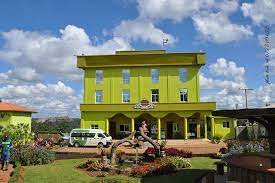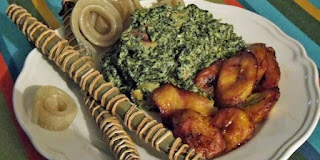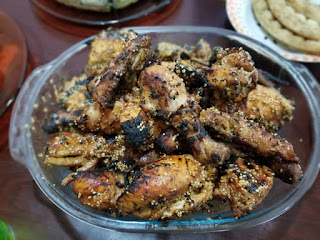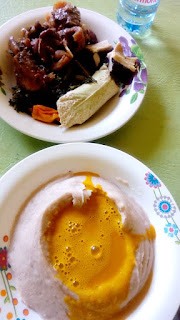fonka's perspective
Search This Blog
Thursday, January 6, 2022
Welcome Africa Episode 4 ( Food & Drink)
Friday, December 31, 2021
Welcome Africa Episode 3 (Lodging)
Welcome back Africa! It is probably the biggest call to make for any visitor upon arriving a destination. Where do I stay? How long do I stay? Seasoned travelers use all sorts of guides to help them make the right choice. From online booking sites, to peer reviews and even local fixers, visitors absolutely want to pick a decent and affordable place to live in. They also consider price, distance from city centre or to stadiums and other places they plan to visit.
You don't want the nightmare of power failure (without a backup generator), you don't want low water pressure (and having to use a bucket), no internet access, the TV having no remote or mosquitoes keeping you awake all night. Remember we are in the tropics.
10 days to Africa's showpiece football tournament in Cameroon, trust me the window of finding a decent place to live in grows smaller by the day and prices are going in the opposite direction. The official delegations for the most part have booked most of the top hotels. Leaving the individual traveler (fans, tourists) with either the expensive suites, or very few other options to grapple with.
Overall all of the host cities have a handful of luxury hotels.
The list cannot be exhaustive, in Yaounde you can live in StarLand, Hilton, Boun's, Mont Febe, La Falaise, Merina, Djeuga Palace.
In Douala- Pullman, Onomo, La Falaise (Bonapriso & Bonanjo), StarLand, Krystal, Best Western Plus.
Bafoussam- Zingana, Talotel, Guins Palace, Alitel, in the area Tagidor Garden, La Vallee de Bana
Garoua- Tour D'Argent, La Benoue, Ribadou, Shalom, Motel Plazza, Dreamland, Plateau
Limbe & Buea- Atlantic Beach, Marcsons, Savoy Palmz,, in the area Splendeur, Mountain Hotel, Plaza
My advice- most of these hotels are probably booked by now or have very limited space left.
 |
| United Hotel, Mbankomo-Yaounde |
That leaves you with lots of new hotels blossoming here and there, and others refurbished, that do not feature on the top booking sites. Yaounde, Douala and its environs for example have seen a flurry of new hotels constructed over the past five years. These hotels are certainly not shortlisted by the Local Organizing Committee for official delegations and you stand a higher chance of getting space there. In Yaounde I can think of Franco, United (Mbankomo, City Centre) GFAC, Felicia. In Douala, Vallee de Princes, Akwa Palace, Ibis, Princes des Galles, Lewat, In Limbe Musango beach hotel, Holiday Inn, Miramare View, Ocean Breeze, Lk, Fini...
My advice- search more in this category, the newer the hotel the better.
As a rule of thumb, moderate Cameroonian hotels are poor at maintenance, so try to go for a recently opened hotel. If possible make a quick check of the room before booking. Also consider access when choosing a hotel. However some really comfortable hotels could be found in areas with poor access. This simply means, you shouldn’t give up on a hotel because it is off a main street. Some really comfy hotels are hidden in neighbourhoods with earth roads. My Advice: Don't judge the book by its cover.
 |
| Onomo Hotel, Douala |
 |
| Atlantic Beach Hotel, Limbe |
While this post, gives you a quick overview of what is available in terms of hotels in the host cities, remember that you can also find some chic Air BnB's in the major cities of Yaounde and Douala. This will be a perfect lodging option if traveling in a small group. My Advice: Check for Air BnB if you are with friends or acquaintances.
If you have a solution for transportation, you could actually live in nearby towns around the host cities and travel into town for the games. The Littoral, South West, Centre, West and North regions have several beautiful towns near the host cities with some breath-taking tourist attractions. In the North you could have a memorable time and stay at Ladgo lakeside (67.8km away) and go to Garoua on match days. In the Centre region you can stay at Sanaga Camping Beach (62.4km away) and travel to Yaounde for the Group games. In the Littoral, you can live in the beautiful Atlantic city of Kribi (170km away) and watch games in Douala. In the West region you can live on the highly demanded Petpenoun estate (43km away) and watch games in Bafoussam. While Limbe is easily accessible from Douala and Buea. My advice: Look at nearby attractions and lodging and take into account traffic delays when moving on match days.
Thursday, December 9, 2021
Welcome Africa! Episode 2 (Transport)
Hey, it's been a bit quiet in here. A rollercoaster of events have kept me glued to work, but I always keep to my word. When heading to a new destination, we usually plan where to stay, what to eat, what to wear, and which places to visit. The experienced traveller would agree that mobility is a crucial and often neglected bit of the puzzle.
Travel in and around Cameroon is essentially by road, air and rail. The reality on the road changes significantly in terms of comfort and price depending on several factors. Where you are? Which time of the day it is? Which agency you are using?
Of the five host cities, only Limbe does not have an airport but it is just an hour and a half from Douala by road. International flights will get you directly into the economic hub Douala, and the capital Yaounde. Touchdown in Douala or Yaounde the two main ports of entry could offer a completely different reality from landing in Bafoussam or Garoua. Domestic flights will connect you to most of the major cities in the country.
Expect yellow taxi cabs in Douala and Yaounde for international arrivals. A trip from the airport into town costs approximately 17 USD (10.000CFAF). There are also some private shuttle services provided by private companies (more comfortable and more expensive) and in some cases bus shuttle services provided by hotels. My advise- arrange for pickup upon arrival.
For inter-city travel most bus companies operate hourly trips between the major cities. Yaounde to Douala costs averagely 8,000 CFAF (14 USD). The train service operated by the Cameroon Railway Corporation is also an option with its new express train with five intermediate stops. First class passengers pay 10,000 CFAF (17 USD). My advise- bus and train are slower but quite safe.
Monday, November 8, 2021
Welcome Africa!
Woo Hoo! Africa will be coming home in 61 days. Home is Cameroon, proud hosts of the 2021 Africa Cup of Nations.
As a journalist who has criss-crossed Cameroon for 15 years, and spent the most part of my childhood and professional life traveling the land for education or work, there is no better way of sharing my experience of the country with you than in this special series on Cameroon.
As a google maps contributor fonka mutta with travel experience across four continents from Jegu to Cape Town. I have a clue on some of the details that can make your trip to Cameroon fun.
First of all, welcome to Africa! Our tourism may not be as popular as our football, but trust me there are quite some unique experiences to live in this country. From food to people, culture to agriculture, wildlife and landscapes, Cameroon is certainly Africa.
For the basics Cameroon is home to some 24 million people mostly youth. We speak about 230 different languages, including the two official languages French and English, and the hugely popular pidgin-English spoken in most of West Africa and other former British colonies.
Cameroon has four cultural zones, the Sahel, the equatorial forest, the coastal and grass-fields.
The climate may vary depending on if you are in the breath-taking desert plains of the north, the cattle-rich midland mountains of the Adamawa, or coursing through the wildlife and fauna of the southern rainforests. No need for winter clothes though, the seasons are essentially dry or rainy. The weather will be bright and sunny during the Africa Cup of Nations tournament that runs from January 9 to February 6, 2022.
Eish! Every football lover has certainly heard a thing or two about football and Cameroon. Legendary players, historic rivalries, colourful fans. The last AFCON to be hosted by Cameroon was in 1972. Close to 50 years later football is coming home, Africa is coming home. Five bustling host cities and 6 buzzing state-of-the-art stadia await you. So do 24 million proud Cameroonians waiting to showcase our cuisine, culture, customs, clothes and nightlife.
Take your seats, buckle up and brace up for an exciting four weeks bumpy but unforgettable ride. Over the next couple of weeks our series, will give you tips on where to stay, what to eat, how to travel and the must-see places in Cameroon.
Sunday, October 11, 2020
Inside Campo-Ma'an National Park
I took off this weekend to reconnect with nature. My destination the Dipikar island in the Campo Ma'an National Park, renowned for its amazing wildlife and fauna. Home of the West Africa lowland gorillas. I was accompanying two singers (Mr Leo and Wax Dey) and actress (Laura Onyama), who were visiting as WWF champions to advocate for a new climate deal for wildlife and communities.
 |
| (Left to Right, Fonka, Mr Leo, Onyama, Wax Dey) |
The trip to Campo certainly had its own challenges. As tropical rains whipped the ground, it became evident why the WWF conservationists put their most robust Landcruiser vehicles and several teams of experienced drivers at our disposal.
The wooden and stone bridges for the most part leading up to the National Park could do with some repairs and refurbishment to make them safer. As the slippery roads heightened the risk of skidding on the often narrow treacherous road. In the wettest areas, heavy-duty trucks had left ridges of mud, making it tough even for the most dexterous drivers.
The 75km drive south of Kribi towards Campo took roughly 3 hours, we left the comfort of the tarmac at the Kribi Deep Sea Port area, for the off-road trip. The little town of Campo sitting next to Bata in Equatorial Guinea was a small charming coastal town, its vegetation divided between the coastal areas, and the dense equatorial forest, home of mainly the Baka and Bagyieli pygmies.
From Campo to Dipikar we covered another 25km drive to the Bangola bridge the gateway into the Dipikar Island, the richest portion of the park. From Bangola the crew of eco guards, conservationists, and artists trekked another sweaty 6km on a muddy footpath almost silently, respecting tips provided by trackers that the gorillas were last sighted in the area.
Anougue France, Gorilla Health Monitoring Assistant and her team of trackers welcomed us to their modest camp and briefed us on the Gorilla Habituation Project. Despite the persistent rains, the crew was determined to cover another 4km to the area where the gorillas were last sighted.
After close to an hour, we came to an area where we had to leave the footpath and venture further into the untouched forest.
 |
| Vets and Trackers at Dipikar |
The guides pausing each time our untrained boots cracked twigs noisily, urging for caution. The adrenaline rose when two or three trackers converged around an over 5m tall tree and pointed up towards its foliage. The first few looked up and saw nothing, then as our eyes adapted to the sun rays piercing through the tree canopy, a black shape became apparent at one of the tree-forks.
It sat there peacefully obviously aware of our presence long before we could spot it. But determined not to be disturbed. No sounds, the specialists said is a sign that its habituation is on course, and it tolerates the human presence. Occasionally it lets it's huge arms hang down from it's resting place. "It has been a wet day" France explained, "this is their rest hour, that is why they went high up to the trees to bask in the sun."
We obviously want to see more of the troop of about 26 gorillas believed to be high up in the trees or around us. An exact figure of the real gorilla population is still to be completed. The trackers suggest we retreat so that they try to lure them down for the photographers desperate for a shot. Several clicks are heard, but the gorillas refuse the invitation to come down. Despite ruses like clicking sounds made with the tongue and ripping off leaves like food to attract them, they don't yield.
We decide to leave them alone. Happy to have seen them high above us. The wildlife champions now fully understand their role, encourage the government to do more to protect such endangered species, and promote ecotourism. A tough job, they have bravely taken upon themselves to do. Put their star power at the service of wildlife and make an even louder call for a new deal for nature and peoples.
Human activity around the park is on the rise, with agricultural concessions being granted to industrialists, the construction of the Kribi Deep Sea Port, and much more. Not every part of the Campo Ma'an National Park is as secluded as Dipikar, surrounded by the Bangola and Ntem Rivers. To keep this little piece of paradise happy government must intentionally step up its wildlife policies, conservationists' stress.
 |
| Filmmaker Anurin captures a butterfly on my head |
If seeing these gorillas, was simply breathtaking, I couldn't help but admire the simplicity of the locals, and their ingenuity. From the fireplace to the handwash, their tables were eco-friendly and original.
Thursday, March 26, 2020
His Musical Laughter
It will take us another century to hear a voice like he's.To enjoy a breath that frees. His towering figure made him taller than most men. His big heart seemed to accommodate even the smallest of us. His mastery of the sax and other instruments left us in awe.
I remember asking for a selfie at the Warda Sports complex in 2000, as a young reporter backstage. And he paused and smiled. A true star. Immense yet accessible.
I always remember the 'Aye Africa' video with the jolly Pops playing to and with children of the world.
We grew up with his smooth effortless tunes. That blew through our spirit with the freshness of the Wouri breeze.
The more I listened and understood music, the more I realized that this Pops was more than a tall black happy man. He was a genie with the power to take away our pain.
So when I felt low in Molyko I listened to his music. He played and laughed. Enjoying every bit of it. Making it feel less like work and more of pleasure.
I was on an international flight once and sat next to this young white girl who must have been less than 8. A flight attendant had tucked her in her seat. She was traveling alone. After chatting briefly with this child. I gave her one of my earphones and played her some of his music. She smiled as she listened.
When she asked who was playing. I told her it was the Louis Armstrong of Africa. She was marvelled. And the music did to her what it does to me.
I remember a work visit to Seoul in 2015. Sat with media personalities across the world. They started paying attention to me when I said I covered Boko Haram. An outspoken Ugandan journalist wasn't too impressed. But when he realised what music I listened to. He immediately warmed up to me. And told me how BIG this musician is.
At the end of the trip he surprised me at the farewell lunch. He suggested I speak on behalf of the delegation. Saying I was the youngest but a real leader.
I have never separated with his music since. It is always in my pocket, ears or rucksack.
Thank You. Manu.
Thank You Groovy Pops.






























